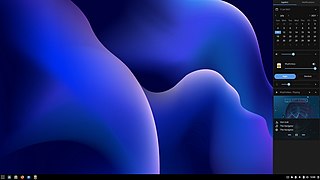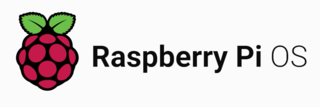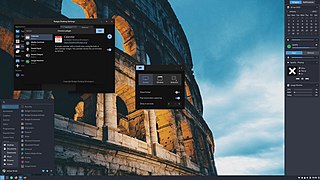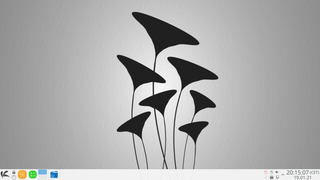
A Linux distribution is an operating system made from a software collection that includes the Linux kernel and often a package management system. They are often obtained from the website of each distribution, which are available for a wide variety of systems ranging from embedded devices and personal computers to servers and powerful supercomputers.
Technical variations of Linux distributions include support for different hardware devices and systems or software package configurations. Organizational differences may be motivated by historical reasons. Other criteria include security, including how quickly security upgrades are available; ease of package management; and number of packages available.

Joli OS was an Ubuntu-based Linux distribution created by Tariq Krim and Romain Huet co-founders of the French company Jolicloud. Joli OS is now an open source project, with source code hosted on GitHub.

Peppermint OS is a Linux distribution based on Debian and Devuan Stable, and formerly based on Ubuntu. It uses the Xfce desktop environment. It aims to provide a familiar environment for newcomers to Linux, which requires relatively low hardware resources to run.

Unity is a graphical shell for the GNOME desktop environment originally developed by Canonical Ltd. for its Ubuntu operating system. It debuted in 2010 in the netbook edition of Ubuntu 10.10 and was used until Ubuntu 17.10. Since 2017, its development was taken over by the Unity7 Maintainers (Unity7) and UBports.

Kiwix is a free and open-source offline web browser created by Emmanuel Engelhart and Renaud Gaudin in 2007. It was first launched to allow offline access to Wikipedia, but has since expanded to include other projects from the Wikimedia Foundation, public domain texts from Project Gutenberg, many of the Stack Exchange sites, and many other resources. Available in more than 100 languages, Kiwix has been included in several high-profile projects, from smuggling operations in North Korea to Google Impact Challenge's recipient Bibliothèques Sans Frontières.

Leafpad is a free and open-source graphical text editor for Linux, Berkeley Software Distribution (BSD), and Maemo that is similar to the Microsoft Windows program Notepad. Created with the focus of being a lightweight text editor with minimal dependencies, it is designed to be simple-to-use and easy-to-compile.

Solus is an independently developed operating system for the x86-64 architecture based on the Linux kernel and a choice of Budgie, GNOME, MATE or KDE Plasma as the desktop environment. Its package manager, eopkg, is based on the PiSi package management system from Pardus Linux, and it has a semi-rolling release model, with new package updates landing in the stable repository every Friday. The developers of Solus have stated that Solus was intended exclusively for use on personal computers and will not include software that is only useful in enterprise or server environments.

elementary OS is a Linux distribution based on Ubuntu LTS. It promotes itself as a "thoughtful, capable, and ethical" replacement to macOS and Windows and has a pay-what-you-want model. The operating system, the desktop environment, and accompanying applications are developed and maintained by elementary, Inc.

Raspberry Pi OS is a Unix-like operating system based on the Debian GNU/Linux distribution for the Raspberry Pi family of compact single-board computers. Raspbian was developed independently in 2012, became the primary operating system for these boards since 2013, was originally optimized for the Raspberry Pi 1 and distributed by the Raspberry Pi Foundation. The Raspberry Pi Foundation replaced it 2020 by Raspberry Pi OS.

Borg is deduplicating backup software for various Unix-like operating systems.

Snap is a software packaging and deployment system developed by Canonical for operating systems that use the Linux kernel and the systemd init system. The packages, called snaps, and the tool for using them, snapd, work across a range of Linux distributions and allow upstream software developers to distribute their applications directly to users. Snaps are self-contained applications running in a sandbox with mediated access to the host system. Snap was originally released for cloud applications but was later ported to also work for Internet of Things devices and desktop applications.
Crouton is a set of scripts which allows Ubuntu, Debian, and Kali Linux systems to run parallel to a ChromeOS system. Crouton works by using a chroot instead of dual-booting to allow a user to run desktop environments at the same time: ChromeOS and another environment of the user's choice.

Zorin OS is a Linux distribution based on Ubuntu with both free and paid versions. It uses a GNOME 3 and XFCE 4 desktop environment by default, although the desktop is heavily customized for users more familiar with Windows and macOS.

Windows Subsystem for Linux (WSL) is a feature of Microsoft Windows that allows developers to run a Linux environment without the need for a separate virtual machine or dual booting. There are two versions of WSL: WSL 1 and WSL 2. WSL is not available to all Windows 10 users by default. It can be installed either by joining the Windows Insider program or manually via Microsoft Store or Winget.

Budgie is an independent, free and open-source desktop environment for Linux and other Unix-like operating systems that targets the desktop metaphor. Budgie is developed by the Buddies of Budgie organization, which is composed of a team of contributors from Linux distributions such as Fedora, Debian, and Arch Linux. Its design emphasizes simplicity, minimalism, and elegance, while providing the means to extend or customize the desktop in various ways. Unlike desktop environments like Cinnamon, Budgie does not have a reference platform, and all distributions that ship Budgie are recommended to set defaults that best fit their desired user experience.

GeckoLinux is a Linux distribution based on openSUSE. It is available in two editions: Static, which is based on openSUSE Leap, and Rolling, which is based on openSUSE Tumbleweed.

KaOS is a desktop Linux distribution that features the latest version of the KDE desktop environment, the LibreOffice office suite, and other popular software applications that use the Qt toolkit.

Q4OS is a light-weight Linux distribution, based on Debian, targeted as a replacement for operating systems that are no longer supported on outdated hardware. The distribution is known for an addon called XPQ4, which adds themes intended to replicate the look and feel of Windows 2000 and Windows XP.


















